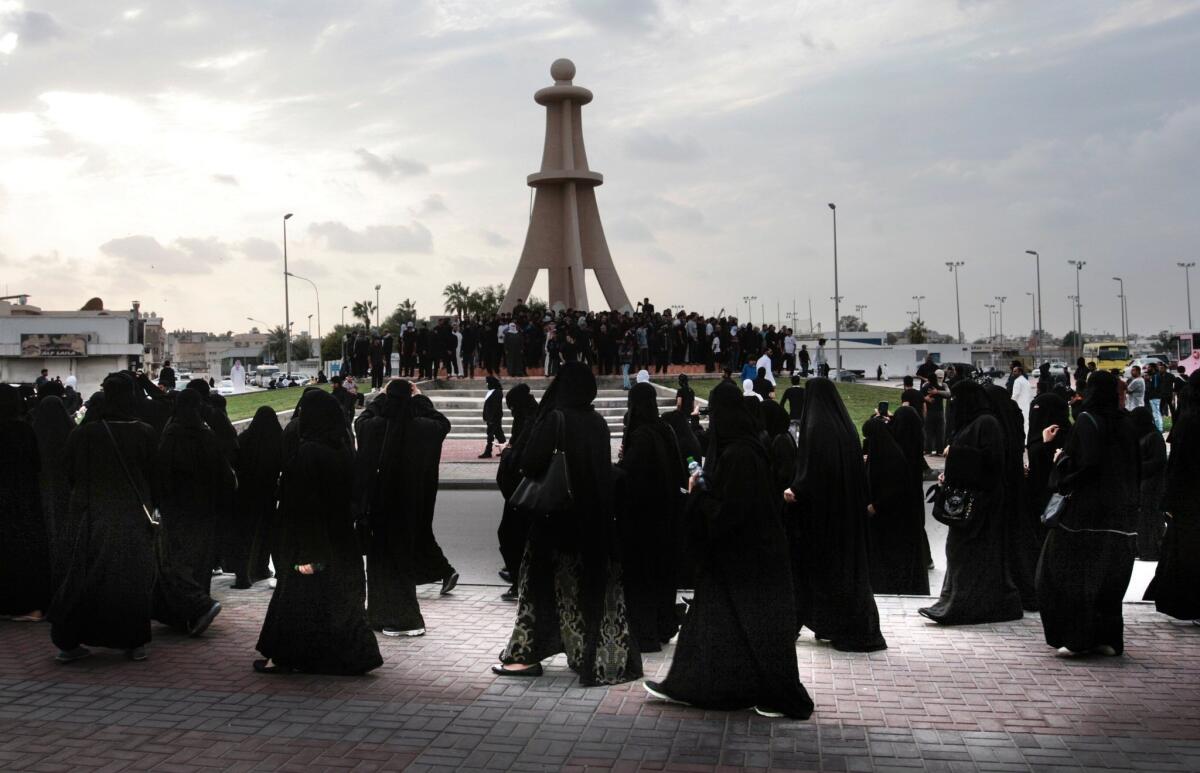Who was Sheik Nimr al-Nimr? A look at the man whose execution rocked the Mideast
Saudi Arabia’s announcement last week that it had executed 47 militants and dissidents prompted international condemnation and sharply widened the rift between the desert kingdom and archrival Iran.
Protesters attacked the Saudi Embassy and consulates in Iran; in response, Saudi Arabia and several of its allies severed or downgraded diplomatic relations with Iran.
But the uproar was largely inspired by just one of the 47 executions: that of Sheik Nimr al-Nimr, a Shiite Muslim cleric who had been virtually unknown outside Saudi Arabia before his arrest in 2012.
Who was Al-Nimr? And why did his execution rock the already-tense sectarian fault lines of the Middle East?
The cleric was from Awamiya, a village in Saudi Arabia’s far east, near the Persian Gulf. In a country that is predominantly -- and officially -- Sunni Muslim, the village is in a region that is predominantly Shiite, and has long complained of religious discrimination.
Born in 1959, Al-Nimr came from a Shiite family famous for its history of resistance. In 1929, his grandfather led an armed revolt against government tax collectors and missionaries from the Sunni Wahhabi sect.
Yet Al-Nimr was “typically regarded as a second-tier political player,” according to a 2008 U.S. diplomatic cable disclosed by the anti-secrecy website WikiLeaks. This, the cable said, was largely because he was not directly affiliated with the two main Shiite blocs in the area.
The cable, however, noted that Al-Nimr was “currently gaining popularity locally, particularly with young people.” It said he appealed to the poor, who were bearing the brunt of Saudi Arabia’s economic malaise and saw little sign of reform in the government’s relations with Shiites.
Shiites in Saudi Arabia, accounting for 10% to 15% of the population, face “systematic discrimination in religion, education, justice and employment,” a 2009 Human Rights Watch report said.
“Saudi Shia are virtually excluded from serving in senior government posts, the security services, the Foreign Ministry and the justice system,” Human Rights Watch researcher Adam Coogle said in an email.
They also face severe restrictions in their religious practice, and Saudi school textbooks “continue to use coded language to refer to Shia as unbelievers/polytheists,” Coogle said.
The weapon of the word is stronger than bullets.
— Sheikh Nimr al-Nimr
Top Shiite leaders in the country have chosen to eschew armed struggle and work with the government to improve Shiites’ status. Al-Nimr also opposed the use of arms, but refused to soften his rhetoric.
“He was someone who was seen as taking an uncompromising view against the regime,” said Joas Wagemakers, an Islamic studies scholar at Utrecht University in the Netherlands.
“He always remained steadfast in his belief that the regime was the problem, and no amount of talking or accommodation with the regime will solve these problems, since the regime was fundamentally opposed to the Shiites’ interests,” he added.
It made Al-Nimr a marginal, perhaps even awkward, figure for other Shiite leaders.
“He was like that crazy uncle you hear at parties, but he was someone you really loved,” said Wagemakers.

Saudi Shiite women (front) and men (back) take part in a Jan. 2, 2016, protest in the eastern coastal city of Qatif, Saudi Arabia, against the execution of prominent Shiite Muslim cleric Nimr al-Nimr.
It was during the 2011 “Arab Spring” uprisings that his popularity surged.
“From the very beginning he said, ‘We should do street protests and we want an Arab Spring in Saudi,’” said Toby Matthiesen, a senior research fellow at Oxford University.
“He was the only cleric to unconditionally support the protest movement. Others initially supported it, but then issued fatwas [religious edicts] saying to go home, and he said no, peaceful demonstrations is the way forward,” Matthiesen said.
When clashes with security forces in Awamiya turned bloody in October 2011, the cleric called for calm, saying that “the weapon of the word is stronger than bullets.”
Still, he refused to back down.
In a televised sermon, Al-Nimr’s gentle, almost avuncular mystique was transformed by anger.
“Stretching over a hundred years, we [Shiites] experience oppression, injustice and terrorization. From the moment you are born, you are surrounded by fear and terrorizing and pursuit and pain,” he railed.
“I am more than 50 years old, I have never felt security nor peace in this country,” he added.
But he was accused of going too far when, in June 2012, he practically rejoiced after the death of the much-hated Crown Prince Nayef ibn Abdulaziz (who led the crackdown on protesters).
“Where are the soldiers of Nayef now?” he asked in a sermon that circulated on social media. “Can they protect him from the Angel of Death?”
He also criticized the succession of the Saudi monarchy, which has been passed among the now-geriatric sons of King Abdulaziz ibn Saud, Saudi Arabia’s founder.
“Why should he remain king? Why does [the king] not retire? Must the Angel of Death come and take his soul?” asked Al-Nimr.
It proved too much for the government. A month later, Al-Nimr was arrested in a shootout with Saudi security forces, who claimed the cleric and those accompanying him had fired at them. Still, the only person injured was Al-Nimr, who was shot in the leg before being apprehended.
His subsequent trial, according to Coogle, was problematic. He had no access to his lawyers during interrogations; they were also not always informed of trial dates; there was a delay in giving him details on the charges against him, which further hindered his ability to prepare an adequate defense.
The government also accused him of having contacts with Iran, a charge that observers believe was untrue.
“Of course Iran loved his speeches and used him in the media and loved him in the protests, but he didn’t get his orders from Iran,” said Matthiesen.
Join the conversation on Facebook >>
While in exile in Iran, Al-Nimr joined the Shirazi movement, hard-liners who wanted to see an Iranian-style Islamic revolution in Iraq. He left the group when Iran ultimately rejected and exiled the Shirazis.
After Al-Nimr returned to Saudi Arabia in the 1990s, he was repeatedly arrested or detained by authorities.
“He was just someone whose primary concern was to speak truth to power who refused to backtrack on his speeches,” Matthiesen said. “In prison they gave him an opportunity to apologize for everything, but he refused.”
When Al-Nimr was ultimately sentenced to death, it transformed him from a minor Saudi figure to an international cause celebre.
His execution last week has now turned into a public relations nightmare for Saudi Arabia, which has been excoriated for its dismal human rights record even as it serves on the United Nations Human Rights Council.
“He’s a martyr now and he will never be forgotten,” said Matthiesen.
Bulos is a special correspondent.
MORE FROM WORLD
U.S. initiatives at risk as Mideast tensions rise
A mayor in Mexico is shot dead a day after taking office
India faces questions over its handling of a militant attack
More to Read
Start your day right
Sign up for Essential California for news, features and recommendations from the L.A. Times and beyond in your inbox six days a week.
You may occasionally receive promotional content from the Los Angeles Times.







